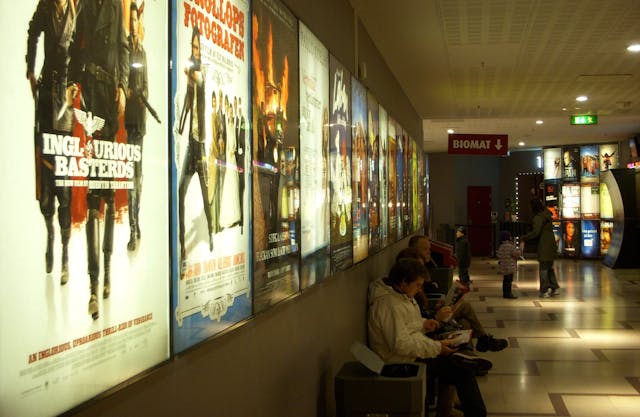Jason Anderson and Short Cuts at Toronto International Film Fest 2022

It all begins when you fall in love with film production. Jason Anderson has vivid memories of taking buses from the suburbs into Toronto, looking for Art House cinemas, repertory theaters, and video stores where he could feed his hunger for cinema. “Now I’m gonna watch all the Kurosawas! All the Tarkovskis!”. The completist spirit serves him well, now that he is the International Programmer for Short Cuts at the Toronto International Film Festival. About 4,500 short films were submitted for this year's film festival, of which only 39 will make it into the final selection.
Playing the Film Festivals Game
We caught up with Jason in the run up to TIFF, to get some wisdom about how young filmmakers can play the Festival game.
Let’s talk about short films as an art form. Should we consider them a stepping stone toward making feature-length films, or that is too reductive?
It is kind of how it functions in the film production marketplace or how it might function in the development of a particular filmmaker, certainly. There is that side of it, the short as a piece of development. You are learning. You are going to school, or maybe you are not going to school, but you are learning your craft, developing your voice through films that may start as shorts and then move on to something longer.
Then, there is this whole other side to it: the short form. Like, the short story versus the novel, or a poem versus a short story. There are things that are intrinsic and important to the actual form. A short story is not a condensed novel, as a short film is not a condensed feature. There is a certain way, poetry or aesthetics to that form that is very, very special. They are kind of distinct forms in the sort of ways they function and flow, which are very particular to them. That is why I find that a perfect 3 minutes film is as satisfying as a perfect 90 minutes.
We get a lot of shorts by filmmakers who are just kind of coming out of school or finishing school and are heading towards features. They may look at the shorts they are making as a sort of building block for an eventual feature they're going to make. But there are also established filmmakers that are already making features, but also making shorts. There’s always going to be ideas that should be shorts, they shouldn't be features. We have one of those this year. Le Pupille is a piece that was commissioned by Alfonso Cuarón. He basically asked Italian director Alice Rohrwacher (Happy as Lazaro, 2018) if she wanted to make a holiday short for Disney+, so she has!

Is there a profile of the films that make it into the selection at Short Cuts? How do I know if this is the right platform for my indie movies?
It’s tough. The heartbreaking thing is that you always have way more films than what you can play. This year we had a bit of a rise in submissions. We had nearly 4,500 films submitted for shorts, and I think the final tally is 39. I’ve had to say no to great films all the time.
And in terms of what kind of thing makes it through, and makes it into the selection, a lot of it has to do with the overall selection, the overall package. I could fill this Festival with nothing but amazing coming of age stories.
So, you curate a selection that doesn't repeat themes, styles or genres?
That is a huge thing, a huge objective for me with ShortCuts at TIFF. We are very conscious about trying to show the world, and show everyone in the world. And the Festival certainly has been pushing very hard, for a long time, trying to get films from Africa, or the Middle East-North Africa, or Latin America and the Spanish diaspora.
We try to find a balance between films from places where they have a lot of films, and a lot of structure for filmmakers to lean on. There is a high volume of films we would get from the US or France, and we try to balance that with places where there are not those sorts of support, or opportunities necessarily.
The same goes for style, showing all kinds of people, and not just the whitest possible representation. That also makes sure we get a most exciting festival too! We are interested for the viewers to see that, not just the same kind of story from the same kind of person and the same kind of place over and over again, as great as those individual films can be.
How does the process of curating go?
Certainly it’s a very collaborative thing. It’s me seeing things, and Sonja Baksa, Short Cuts programming associate, is an invaluable second brains for me this year. We have this whole other team of screeners, seeing things, or passing things up the chain, or writing notes, sharing opinions. It’s necessary when you have this much, this incredible volume of submissions, it’s sort of like a firehose shooting films at you for many months continually. It’s hard to stay on top of it, because you really don’t want to miss anything.
Does it make a difference if you submit your flick early?
It’s a tricky one to answer. It can, but it often doesn’t. The selection develops over time. One of the challenges is not to make too many early decisions, because I just know there is so much more that has to be seen. So, you don’t box yourself in and say, “Oh, this is a film that we wanna take from such and such place!”…no. Maybe you are going to have just one film from that place. And then, down the line, you see another one that you like a lot, or seems fresher.
We have to be flexible, you have to keep the process open. So it doesn’t matter when you send it in. The key is that you send it when you feel like you are ready to share it, that’s the right time.
The definition of how long a short film should be varies wildly for film festivals. Toronto has a 40-minute limit. Cannes’ is 15! How did you guys decide on that number?
A big factor is what the Academy of Motion Picture Arts & Sciences has as their limit for what can be considered in the short category, which is 40 minutes.
In a way, it is unfortunate because there is a lot of mid-lane stuff. I always feel for filmmakers or teams who are doing something that falls in that mid-range. Often, it’s something that maybe some schools are kind of encouraging or want. Or that kind of length facilitates distribution or sales in European television.
For major festivals, it’s hard to use those. But some short festivals that I love, like in Clermont Ferrand in France, or Bogota Shorts, Au Regard in Canada, do have a lot of that mid-lane stuff which is great, because otherwise it would be hard to find a place for it.
There are a lot of film festivals! Of course, everyone wants to get into the major ones, but… How should young filmmakers decide where to submit a flick?
There are a lot of nuances of what makes one film fit better with another, but I think the best thing you can do is to find out what you can about the films that have played at those places. Are there films like mine? Where do they go?
There are all these other Film Festivals, that I am still discovering too, that are great festivals! They can give a film a great life. Can even get you an Oscar Nomination, because there are tons of these film festivals which are also Oscar qualifiers. In fact, many of the films nominated over the years did not play major film festivals.
Ask yourself what you want from your film, too. What is your best endgame? Is it to play a lot of film festivals? Is it to play at a major festival? Is it to get a particular kind of representation? To take a particular step in the film production industry? Sometimes it’s not about playing the right Festival, but to show your film to a producer that will get excited about you and your work. Maybe the purpose is for you just to understand something about your own voice, what you wanna do, or collaborator, a friendship, or a connection you made in the process.
Basing it all into “if it doesn’t get into TIFF…” or “if it doesn’t get into Sundance…” It's kind of dangerous. It’s hard to base things on the outcome. It’s not really about that ONE short. It’s about that continuum, that bunch of work that you may be working on. That short might not get into the selection, but it might open the door to the next thing.
What advice would you give a young filmmaker tackling his first short?
I think you have to be very conscious of the question of “what is art for”? This is a big question! Also, “Who are you making it for?” And really, concentrate on the process. Over the years I’ve realized that the happiest, the most functional creative people I know are the people that are very immersed in what they are doing. They are very conscious of the questions they are pursuing in their work. If you are doing whatever it is and it’s hinging on the outcome. Say, selling a million singles, or a hit movie or whatever…Things are so unpredictable in the world! Things that are just great don’t find an audience, or maybe not right away.
Again, filmmakers who make it into these big selections, have the next thing in mind. So that when they get a little bit of film production industry heat or whatever interest they can go, “OK, well, I made this thing, but now I’m going to do this next”...instead of being like, “Hi, I made this thing and I’m kind of done!” and sort of wait for all these doors to be open. No, you gotta keep leaning into it. You gotta keep pushing the doors.
What can we expect from this year’s selection? I know you can’t play favorites, but, is anything in particular that got you excited?
It is very gratifying to have all these 39 movies!. There is a movie from Colombia, from Duván Duque Vargas, "Todo Incluido". It is 20 minutes, but it gives you an idea of everything it can be. It brings closer the power and nuances of a function, and it is very intelligent. It is an incredible piece.
* Update:
The Toronto International Film Festival took place from September 8 to 18, 2022. The Short Cuts Award for Best Film was "Snow in September," directed by Lkhagvadulam (Dulmaa) Purev-Ochir. You can watch it at The New Yorker YouTube Channel.
The award for Best Canadian Film went to "Simo", directed by Aziz Zoromba. Check out the trailer!
The "Share her Journey Award went to Carol Nguyen for "Nanitic." Check out the trailer.
* This interview has been edited for length and clarity.
Want to get an email when we publish new content?
Subscribe today



























